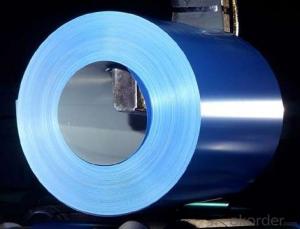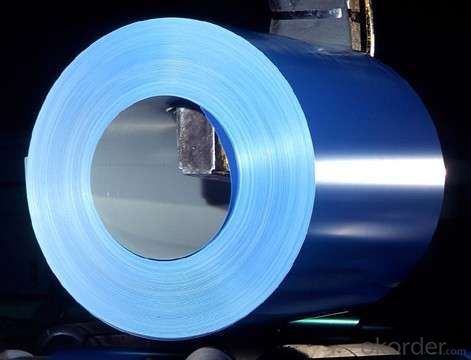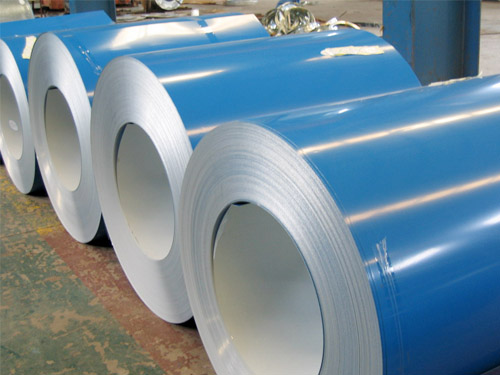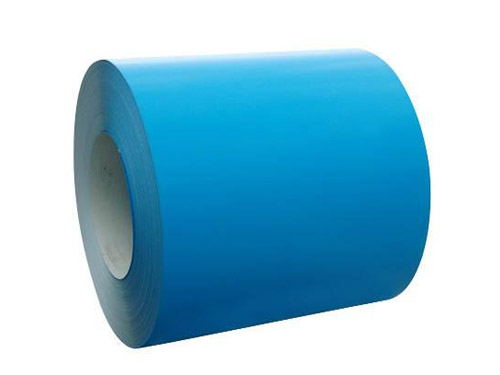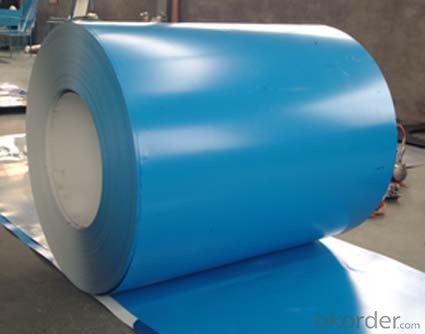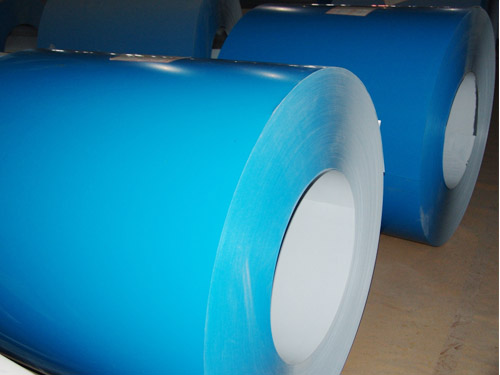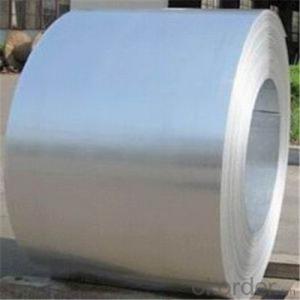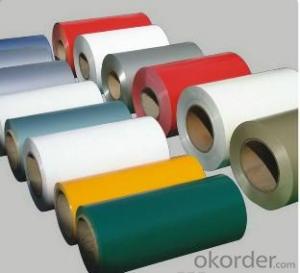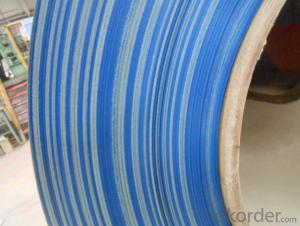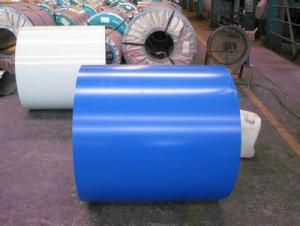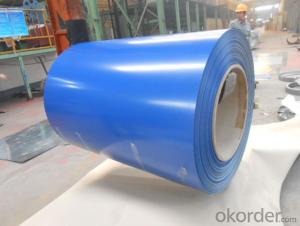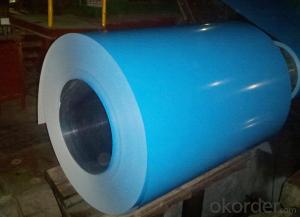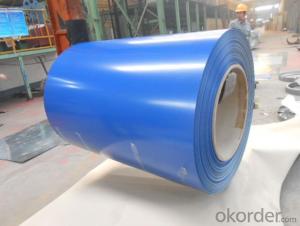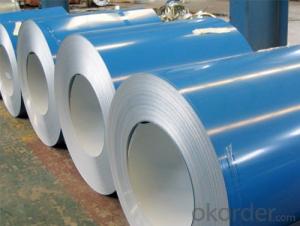Pre-Painted Galvanized Steel Coil Sky Blue Color
- Loading Port:
- Shanghai
- Payment Terms:
- TT OR LC
- Min Order Qty:
- 100 m.t.
- Supply Capability:
- 10000 m.t./month
OKorder Service Pledge
OKorder Financial Service
You Might Also Like
1. Pre-Painted Galvanized/Aluzinc Steel Coil Description:
With GI as base material, after pretreatment (degrease and chemical treatment ) and liquid dope with several layers of color, then after firing and cooling, finally the plate steel is called pre-painted galvanized (aluzinc) steel. Pre-painted galvanized steel is good capable of decoration, molding, corrosion resistance. It generally displays superior workability, durability and weather resistance.
2.Main Features of the Pre-Painted Galvanized/Aluzinc Steel Coil:
• Excellent process capability
• Smooth and flat surface
• Workability, durability
• Excellent heat resistance performance
• High strength
• Good formability
• Good visual effect
3.Pre-Painted Galvanized/Aluzinc Steel Coil Images
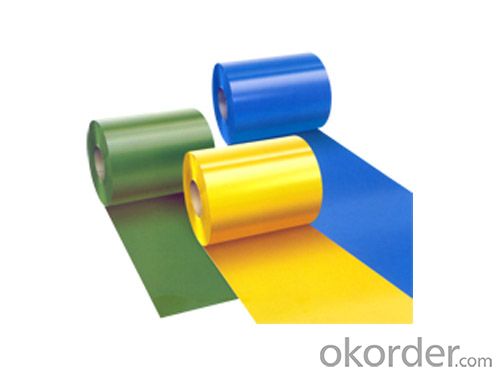
4.Pre-Painted Galvanized/Aluzinc Steel Coil Specification
Standard: AISI, ASTM, BS, DIN, GB, JIS
Grade: DX51D, DX52D
Thickness: 0.17-2.0mm
Brand Name: KMRLON
Model Number: coil
Type: Steel Coil
Technique: Cold Rolled
Surface Treatment: Coated
Application: Boiler Plate
Special Use: High-strength Steel Plate
Width: 20-1250mm
Length: customized
commoidty: pre-painted galvanized steel coil
Thickness: 0.13-4.0mm
width: 20-1250mm
zinc coating: 40-180g/m2
printing thickness: top side: 20+/-5 microns, back side: 5-7 microns
color: all RAL color
surface treatment: color coated
coil weight: 4-7 tons
coil ID: 508/610mm
packaging: standard seaworthy packing
5.FAQ of Pre-Painted Galvanized/Aluzinc Steel Coil
1. What’s the application of this product?
Roof, roof structure, surface sheet of balcony, frame of window, etc.
2. What’s the brand of the paint?
We use the best brand of all of the word—AKZO.
3. How to guarantee the quality of the products?
We have established the international advanced quality management system,every link from raw material to final product we have strict quality test;We resolutely put an end to unqualified products flowing into the market. At the same time, we will provide necessary follow-up service assurance.
4. How long can we receive the product after purchase?
Usually within thirty working days after receiving buyer’s advance payment or LC. We will arrange the factory manufacturing as soon as possible. The cargo readiness usually takes 15-25 days, but the shipment will depend on the vessel situation.
- Q: What are the environmental considerations when using steel coils?
- Some environmental considerations when using steel coils include the extraction and processing of raw materials, energy consumption during production, and the potential for air and water pollution. Additionally, the disposal of steel coils at the end of their life cycle should also be taken into account to minimize waste and promote recycling.
- Q: What are the different types of steel coil grades and specifications?
- There are several different types of steel coil grades and specifications, including hot rolled, cold rolled, galvanized, and stainless steel coils. Each type has its own unique properties and uses. Hot rolled coils are produced at high temperatures and are commonly used in construction and manufacturing applications. Cold rolled coils are produced at lower temperatures and have a smoother finish, making them suitable for applications that require a higher level of precision. Galvanized coils are coated with a layer of zinc to protect against corrosion, while stainless steel coils contain a high percentage of chromium for added durability and resistance to corrosion. Overall, the choice of steel coil grade and specification depends on the specific requirements of the project or application.
- Q: How are steel coils used in the aerospace industry?
- Steel coils are used in the aerospace industry for various applications such as structural components, engine parts, and aircraft frame construction. These coils are often used in the manufacturing process to fabricate strong and durable components that can withstand the extreme conditions of flight.
- Q: Is it just because brass is reloadable? But what makes it reloadable? What does brass bring to the equation that the steel cased ammo can't do?
- Steel okorder /
- Q: When steel is cast, does it become weaker/more brittle or anything of this nature? what are the side effects of steel casting on the steel itself?How can you correct these?
- Cast steel uses specific alloys of steel designed to improve the casting process. It has a specific strength and toughness range based on the alloying ingredients. It physical properties are a bit different from rolled steel. The primary problems with casting steel are porosity and voids or spaces where the mold is not completely filled with molten steel. These do not effect the basic strength of the steel but they can degrade the ability of the casting to function as designed.
- Q: What are the common methods of cutting steel coils?
- The common methods of cutting steel coils include shearing, slitting, and laser cutting. Shearing involves using a machine with two blades to cut through the coil. Slitting involves passing the coil through a set of rotating circular blades to create narrower strips. Laser cutting uses a high-powered laser beam to cut through the steel coil with precision.
- Q: How are steel coils measured?
- Steel coils are typically measured in terms of their width, thickness, and weight. The width is determined by measuring the distance across the coil's widest point, while the thickness is measured by gauging the thickness of the steel sheet. The weight of the coil is measured by weighing it using scales or load cells.
- Q: who, when and where was dual phase steel invented?
- Dual Phase steels refers to a distinct group of alloys which are used for automotive bodies. These were developed to give improved deep drawing (for shaping) and strength while on the road. Most of the work was started at the same time in the 1970s as a response to the oil crisis (history repeats!) with SSAB in Europe, US Steel and British Steel leading the way. There are many variants of the dual phase alloys prefered by each of the auto manufacturers. The work on these steels led the way for TRIP (transformation induced plasticity) steels, rephosphorised steels and HSLA (high strength low alloy) steels. There is a distinction between these steels and duplex steels which typically refer to austenitic/ferrtic stainless steels. Also be aware that everyday low carbon steels with 0.1%-0.6% carbon will have a ferritic/pearlitic structure but are not considered to be dual phase So to summarise: Who - major steel companies worldwide When - from about 1973 onwards (up to around 1977 when the developments went in other directions) Where - Europe, USA and Japan (but I'm not sure who it was in Japan doing the work)
- Q: Why is the steel tape tape head not fixed?
- It makes sense to be irregular;You can see the standard ruler of steel roll head is a gap, when you take the time to object quantity, the head will indent the gap, so you measure is the size of the head from the head of steel;When you hook the object, the head will pull apart and you'll take the dimension from the end of the steel head.
- Q: Is a steel plate the same as a steel coil?
- Generally speaking, they can be used interchangeably, and the purchase price of the plate is slightly cheaper.
Send your message to us
Pre-Painted Galvanized Steel Coil Sky Blue Color
- Loading Port:
- Shanghai
- Payment Terms:
- TT OR LC
- Min Order Qty:
- 100 m.t.
- Supply Capability:
- 10000 m.t./month
OKorder Service Pledge
OKorder Financial Service
Similar products
Hot products
Hot Searches
Related keywords
